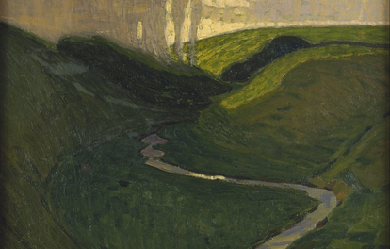Gettysburg: July 1, 1863
The young man, hardly more
than a boy, who fired the shot
had looked at him with an air
not of anger but of concentration,
as if he were surveying a road,
or feeding a length of wood into a saw:
It had to be done just so.
The bullet passed through
his upper chest, below the collar bone.
The pain was not what he might
have feared. Strangely exhilarated
he staggered out of the pasture
and into a grove of trees.
He pressed and pressed
the wound, trying to stanch
the blood, but he could only press
what he could reach, and he could
not reach his back, where the bullet
had exited.
He lay on the earth
smelling the leaves and mosses,
musty and damp and cool
after the blaze of open afternoon.
How good the earth smelled,
as it had when he was a boy
hiding from his father,
who was intent of strapping him
for doing his chores
late one time too many.
A cowbird razzed from a rail fence.
It isn’t mockery, he thought,
no malice in it. . . just a noise.
Stray bullets nicked the oaks
overhead. Leaves and splinters fell.
Someone near him groaned.
But it was his own voice he heard.
His fingers and feet tingled,
the roof of his mouth,
and the bridge of his nose. . . .
He became dry, dry, and thought
of Christ, who said, I thirst.
His man-smell, the smell of his hair
and skin, his sweat, the salt smell
of his cock and the little ferny hairs
that two women had known
left him, and a sharp, almost sweet
smell began to rise from his open mouth
in the warm shade of the oaks.
A streak of sun climbed the rough
trunk of a tree, but he did not
see it with his open eye.


